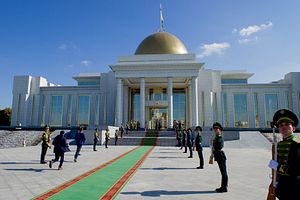The government of Turkmenistan will soon welcome a new U.S. ambassador in Ashgabat. On June 13, 2019, Matthew S. Klimow was sworn in as the next United States Ambassador to Turkmenistan in the Ben Franklin Room at the Department of State. Undersecretary of State David Hale administered the oath on the Bible that Klimow and his father each carried in war.
A graduate of West Point, the new ambassador served as a U.S. Army officer from 1974 to 2003. He commanded at the battalion and brigade level and received a Silver Star in support of Operation Desert Storm. He retired with the rank of Colonel.
In his May 16 testimony before the U.S. Senate, then-candidate Klimow underscored that the United States has long-term interests in Central Asia and that his upcoming work in Turkmenistan presents an opportunity to advance those interests. He specifically noted “porous borders, terrorism, and drug trafficking” as potential threats to Turkmenistan, which shares borders with Iran and Afghanistan to the south.
These concerns resonate with the key challenges (and opportunities) U.S. Central Command identifies in Turkmenistan, including border security and disaster response capability. CENTCOM’s 2019 posture statement specifies that “a struggling economy, a rigid political system, and the Turkmen policy of positive neutrality largely limits international cooperation and Turkmenistan’s security services.” CENTCOM clarifies it mission in Turkmenistan as related to continued “instability in Afghanistan and the potential for the flow of foreign terrorist fighters.” Despite these concerns and its continued presence in Afghanistan, the U.S. intends to maintain a small military footprint in Central Asia.
Matthew Klimow’s testimony before Senate members resonated with current U.S. interest in Turkmenistan’s considerable hydrocarbon resources. Turkmenistan possesses the world’s sixth largest natural gas reserves. Sales of natural gas are Turkmenistan’s main source of income, accounting for 80 percent of export revenues. Until recently China was the country’s sole significant customer. In April 2019, Russia resumed import of Turkmen gas after a three-year interruption.
Klimow pledged in his testimony that he would “make every effort to promote diversification of Turkmenistan’s gas export markets — across the Caspian Sea as well as to South Asia.” This point echoes comments U.S. President Donald Trump made in his congratulatory message to Turkmenistan’s president, Gurbanguly Berdimuhamedov, on the occasion of the Nowruz holiday in May:
The people of the United States of America and its business circles continue to look for new directions to strengthen our economic cooperation with Turkmenistan. I hope that Turkmenistan will be able to take advantage of new gas export opportunities to the West in connection with the recent determination of the legal status of the Caspian Sea.
The United States would like to see Turkmenistan diversify its gas market with a Trans-Caspian pipeline that would carry Turkmen resources to Europe via Baku, Azerbaijan. This gas pipeline is still in the planning stages, however it has been at the core of U.S. interests since the 1990s. The key to recent American outspokenness on the topic was the 2018 Caspian Sea Agreement which reflected the understanding over the waters among the littoral states (Russia, Kazakhstan, Turkmenistan, Iran, and Azerbaijan). The agreement makes allowances for the construction of energy pipelines with each party having jurisdiction over any structures or installations in its sector. In other words, the littoral states will have authority over materials that transit the Caspian’s territory. This makes it more likely that the trans-Caspian gas pipeline project will proceed.
Klimow offered a glancing critique of Ashgabat in his remarks to the Senate when he referred to points on which he intends to engage the government of Turkmenistan “assertively and constructively”:
…the full spectrum of human rights issues, to include the use of forced labor in cotton harvesting and undue restrictions on religious practices.”
While it is admirable that Ambassador Klimow aims to address these pressing human rights issues, he will likely spend even more time fighting what he described with restraint as Turkmenistan’s “weak regulatory environment and excessive bureaucracy.”
The United States is paying attention to the possibility that Turkmenistan will diversify its energy markets. Both the outgoing U.S. Ambassador to Turkmenistan Allan Mustard, and the incoming ambassador have spoken publicly about Turkmenistan’s proximity to Afghanistan and border security, and the potential for American commercial interests in Turkmenistan, but they both also emphasized pipelines prospects. U.S. bilateral relations with Turkmenistan are unlikely to change significantly under Klimow, but his appointment offers an opportunity to assess where U.S. interests in Turkmenistan lie.
Dr. Victoria Clement is the Eurasia Regional Analyst at the Center for Advanced Operational Culture Learning (CAOCL) at Marine Corps University in Quantico, VA.
This work does not represent the view of CAOCL or the Marine Corps.

































